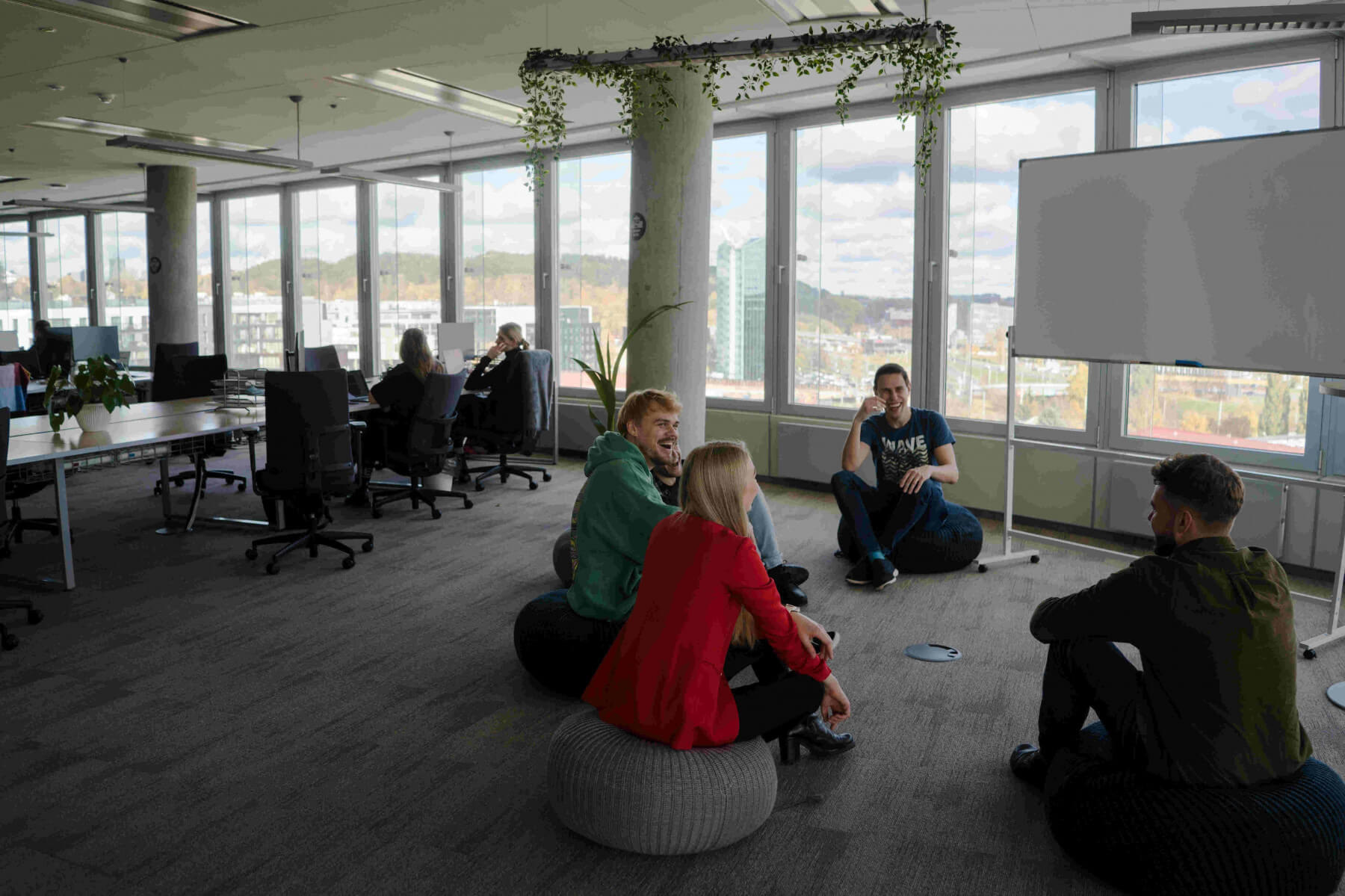


„Surfshark“ nuotr.
Having reached its first million of paying customers in just 30 months, Surfshark is now providing its services in 140 countries and aims to become a global leader in cyber-security.
The personal story of Vytautas Kaziukonis, born in Jonava, is no less interesting. Already at the age of 16, he started his first IT business and moved out of his parent’s home. He quit school at 18, and at 22 decided to change track altogether and went into the timber industry. There, he worked in a number of positions, from office administrator to supply manager. In 2008, with the global economy imploding, he started a business overseas. Finally, upon returning to Lithuania after a decade abroad, he founded Surfshark, while retaining his hobbies – from diving to gliding.
- Surfshark’s products have become among the most popular globally in just three years. And the next step was becoming a unicorn. How did Surfshark come about? What did this entire journey look like?
- I started my first businesses, or business-like projects, in my teenage years. At 16, I jumped head-first into IT, while also trying to strike up a dialogue with the part of the world that doesn’t live on the internet. I deliberately pushed myself into unfamiliar areas because I wanted to see how large-scale companies are managed.
When I eventually came back to Lithuania, I first considered developing products aimed at IT professionals, but then realised that the problem was actually elsewhere. While those with experience online are quite familiar with privacy and security, people who don’t engage with technology every day have few options when it comes to comprehensive security products. These are the people that Surfshark is for – no knowledge of jargon or protocols required.
- At 16, you not only went into IT, but also started your first business. Why? And how?
- Although I did well at the gymnasium and the private school of Achema in Jonava, being young I thought I didn’t need an education. That’s why, already at 16, I started my first company in the ISP segment. Our services were available in Kėdainiai, Jonava, and Kaunas, and I already had a team of four people that I found through the local newspaper.
Business was booming, so I decided to quit school in the 12 th grade, moved out of my parent’s home, and continued dabbling in new businesses and all kinds of other ventures. It was a very interesting and valuable time, but I wouldn’t recommend anyone do as I did and quit school. That’s something I later came to regret and had to finish my studies anyway. I’m not really a good role model, and I wouldn’t repeat those decisions today. And yet, I don’t disavow them because they’re part of the story that brought me here.

- How did the CEO of several IT companies also become an office admin?
- My journey also included a few small businesses or projects, e.g., we were selling telecommunications equipment, and I also did IT admin work. Even so, over time I realised that I was still ignorant of how large companies are founded and managed, what is the board responsible for, or what exactly does an audit mean. Having decided to educate myself about these, I met with the CEO of a timber company, who was also a client of my ISP venture. I told him that I wanted to work there, knowing nothing about timber. I was maybe 22 at the time, and since an office admin position was the only one available, that’s the one I took.
I would bring coffee to guests, fill out timesheets, and work on other admin tasks. Since I had experience with IT and was able to quickly optimise and automate much of the day-to-day business, I had lots of free time. Eventually, I was forced to admit to the CEO that I no longer had anything to do. He then offered me to go into logistics. Since the procedures there were also quite static, I started automating things again.
Then I moved to the supply department. I knew nothing about it at the time and was surrounded by senior professionals in different areas, dealing with a new Asian market. I remember going to the head of production and asking him to educate me about timber processing. He gave me four books, written in Soviet times, and said: “Read these first, then we’ll talk”. I took up the challenge, laid the groundwork of knowledge, and after some time became the next factory supply manager.
The 2008 crash, however, caused many of the traditional businesses to shutter, and I was forced to circle back to IT, where I work to this day.
- But the new business you started was in the U.K., is that correct? And then left Lithuania for over a decade. Why?
- The idea to join the development of a platform for building websites was suggested to me by an acquaintance who’d started a business with his partner in the U.K. The project was aimed at Brits who owned villas in Spain or France – we’d offer building a website for them free of charge, and then continue developing it on a subscription basis. In time, our team grew to 20 people. It was my first real experience working as part of a Western, international team, because half of the staff were Lithuanians, and the rest were Brits. After about five years, though, I grew tired of the U.K., mostly due to the hectic schedule that had me building a business and learning to code all at the same time. So I took my wife and went on a holiday in Fuerteventura. We ended up living there for quite a while.
Set up by the ocean, we slackened our work schedules and enjoyed some rest. I did, however, finish a few personal projects because, as you get used to being constantly on the move, lounging about in a hammock soon gets boring. After that, we went back to Lithuania, where most of our friends lived, and where intriguing new IT challenges had arisen.
- You seem to be good at bringing together seemingly incompatible things. For instance, you’re an IT professional and a businessman. There’s also East and West – international teams, cultural differences. How do you pull it off?
- I’m a curious person, and this helps me connect with others – my interests, work, and hobbies overlap, making it easier to combine them. I also find this kind of variety meaningful. I believe that entrepreneurship can be learned, and that our environments shape us. For this reason, I try to surround myself with people whose communities I want to be a part of.
- You mentioned hobbies. What gets you going outside of work?
- It all started with parachuting – my introduction to air – and continued with the other elements – I tried sailing, diving, surfing, and doing triathlons. Now I compete in the Lithuanian Auto Rally, and have recently got my pilot’s license. So these are my current priorities. I’m especially fascinated by aviation, because it’s all about detail, proving just what an impact seemingly insignificant things can have on the end result. It also teaches you diligence, procedural thinking, and consistency, which I’m also applying in business. By the way, before I started on some of these hobbies, I felt like they weren’t for me and that I would just fail. But that’s the secret, really – consistency, going about things step by step.
- What’s your relationship with social media? Even though your hobby list and your achievements in business are impressive, you don’t boast about them online.
- Since I always found privacy to be important, for a long time I wasn’t on social media at all . I read a lot about security and saw that people didn’t understand its critical importance. Privacy is a natural right, necessary for comfort and safety. Even though we have doors and curtains at home, online everything is shared. Some people tell me they have nothing to hide, but when I propose they make their emails and message public, they say no.
It’s not that social media is evil – it does have its positives. But it’s also important to seriously consider what we share online and how. For instance, I think it’s irresponsible for parents to post pictures of their children, because they don’t know whom they’ll grow up to be, and such early publicity may come back to haunt them. This issue will become increasingly relevant because, in my view, data is the new oil. We may be outraged at the growth of certain industries, and we may invoke regulation, but at the end of the day – we must start with ourselves and be more mindful.
- Surfshark is all about privacy and security. What solutions are you developing?
- We’re currently working on an app that links up products designed to solve online security issues. We started out with only a VPN, but now also have an antivirus called Surfshark Antivirus, a tool warning of user data leaks called Alert, and a private search engine called Search. We’re also working on the Incogni project that will help people to withdraw their data from data merchants. Today’s search engines know more about us than we do ourselves. People ask existential questions, name their illnesses and those of their relatives, and explore everything from religion to sexual orientation. How does this stream of thoughts affect us today and where it’ll be in 20 years? How will the political and cultural environment have changed by then? Are you certain all that data won’t be used against you?

- The cyber-security market is very competitive. What helped you stand out?
- Yes, the market was already quite competitive, but we managed to attract strong talent to our team from the get-go. Not superstars of their respective fields, necessarily, but people who were humble, and modest. People who didn’t crave being in the spotlight. People who’ll sooner give praise to their co-workers than speak of themselves. This, I think, is what made teamwork possible for us and led to superior results.
Our recruiters always look for this special ingredient, alongside vocational and other skills. Also, we don’t look for people to fill specific positions, but more often end up adapting them to individual talents. You can think of it as a picture puzzle – it’s much easier to take a piece and look for a fit than to focus on a specific gap and search for pieces to fill it. So, you speak to someone with a glint in their eye and then guess where their talent could reveal itself most clearly. A part of our boldness to reach higher also came from the Lithuanian startup community – its experiences and success stories. It helped us to gauge our potential.
- Speaking of talent, your team now has almost 500 specialists. You have recently opened an office in Warsaw, and are now planning a division in Berlin, is that right?
- We’re hiring people for different teams – from marketing specialists to finance experts and lawyers – and, of course, we have a large IT division. During the first years, most of them came through personal channels, and now we have a separate human resources division.
Lithuania is not a large country, which is both a joy and a sadness. We do have many companies promoting the Lithuanian brand, but our talent pool is limited, so we have to look elsewhere. Currently, we have people from 15 countries, encompassing the West, the U.S., and Europe. We’re also doing really well in Asia, e.g., in Hong Kong, and in Australia.
- What advice do you have for young startups – how can they replicate your success?
- Persistence and consistency are key. I’ve known lots of people who grew up in unfavourable environments, but through working hard and being persistent eventually find success.
A near-universal rule of success is that you have to try many things, for a long time, until something works. Therefore, I’d like to encourage people to treat mistakes as lessons. Failure doesn’t mean you’ve made a mistake, but rather learned another way of avoiding them. This helps to keep moving forward and not get hung up on self-recrimination.
- Most startups dream of one day becoming unicorns. Tells us – how has Surfshark, and your own life, changed after that moment?
- Becoming a unicorn was never a goal for us, as such. Things have remained the same, really – we haven’t started wasting our money, and haven’t changed our work principles. It is, of course, nice to have reached a certain stage, but success is not about recognition. Startups should have only one goal – to create products the world needs. It’s also my own personal goal, and that’s what we’re working on with our team and will continue to do so.
